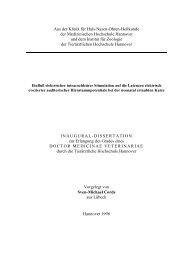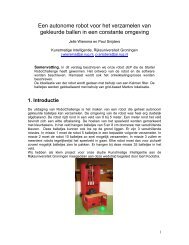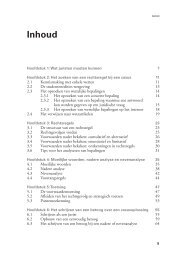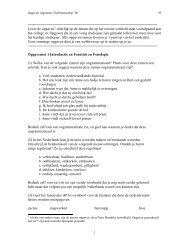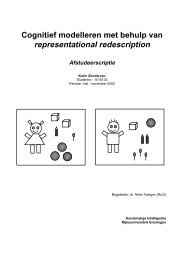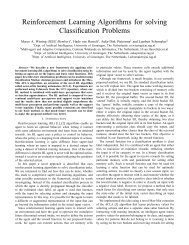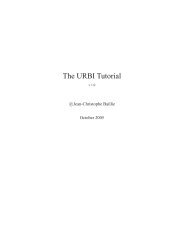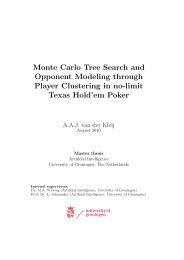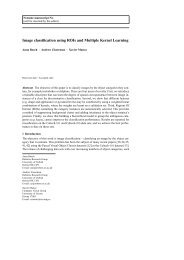Presuppositions in Spoken Discourse
Presuppositions in Spoken Discourse
Presuppositions in Spoken Discourse
Create successful ePaper yourself
Turn your PDF publications into a flip-book with our unique Google optimized e-Paper software.
Chapter 5<br />
(24) Sofia also baked a cake.<br />
(25) John comes to the party too.<br />
(26) a. Beth decorated the room and Sofia baked a cake.<br />
b. Beth decorated the room and Sofia also baked a cake<br />
(27) a. If the boss comes to the party then John comes.<br />
b. If the boss comes to the party then John comes too.<br />
(28) Beth baked a cake. Beth decorated the room.<br />
(29) John comes to the party and the boss comes.<br />
Given an empty context, both (24) and (25) would need to be accommodated. The<br />
same utterance without the trigger might be able to be considered an expression<br />
alternative. However, this won’t work with the above examples if we def<strong>in</strong>e an<br />
expression alternative as updat<strong>in</strong>g the same <strong>in</strong>put context and lead<strong>in</strong>g to the same<br />
output context. Interpret<strong>in</strong>g (24) without also means that you have lost the<br />
<strong>in</strong>formation that someone else did someth<strong>in</strong>g comparable to what Sofia did.<br />
The only alternative is to <strong>in</strong>troduce the presupposed <strong>in</strong>formation by assertion,<br />
as <strong>in</strong> (26) and (27), so that the <strong>in</strong>formation that the trigger was go<strong>in</strong>g to contribute<br />
is already part of the context. The problem with this solution is then that if we add<br />
the presupposed <strong>in</strong>formation before the utterance without the trigger, then we have<br />
changed the <strong>in</strong>put context. There is no longer an expression alternative that will<br />
need to be accommodated, because the use of the trigger <strong>in</strong> this new context will be<br />
resolved by b<strong>in</strong>d<strong>in</strong>g. And b<strong>in</strong>d<strong>in</strong>g will always be a w<strong>in</strong>n<strong>in</strong>g alternative to<br />
accommodation.<br />
The problem here is that we cannot construct assertional alternatives for the<br />
presuppositions triggered by too and also unless we communicate the <strong>in</strong>formation<br />
that would otherwise be accommodated first. As soon as we do that, we have<br />
created an antecedent for the triggered presupposition. This changes the <strong>in</strong>put<br />
context which <strong>in</strong> turn changes the set of relevant candidate alternatives for<br />
generation. Thus, if we def<strong>in</strong>e expression alternatives with respect to the <strong>in</strong>put<br />
contexts, there are no expression alternatives to accommodation for these triggers.<br />
This predicts that accommodation is freely available for too and also. But this is the<br />
opposite of what is claimed <strong>in</strong> the literature and of what we f<strong>in</strong>d <strong>in</strong> the corpus.<br />
Note that the examples with too are therefore very different from the previous<br />
examples with pronouns because <strong>in</strong> those examples there was both an assertional<br />
and an accommodat<strong>in</strong>g alternative that could update the same <strong>in</strong>put context <strong>in</strong> a<br />
similar way.<br />
On the other hand, if we loosen our def<strong>in</strong>ition of alternatives and say that the<br />
<strong>in</strong>put context doesn’t have to be the same at the exact time of the expression then<br />
we can use this explanation to account for too’s behavior. Too doesn’t accommodate<br />
well because speakers prefer to first <strong>in</strong>troduce by assertion and then b<strong>in</strong>d the<br />
presupposed material to it. Because this alternative is always available, we never get<br />
accommodation with too <strong>in</strong> naturally produced data and we as hearers f<strong>in</strong>d<br />
examples where too has to be accommodated anomalous because we know the<br />
speaker could have used a form which wouldn’t have required accommodation.<br />
124



